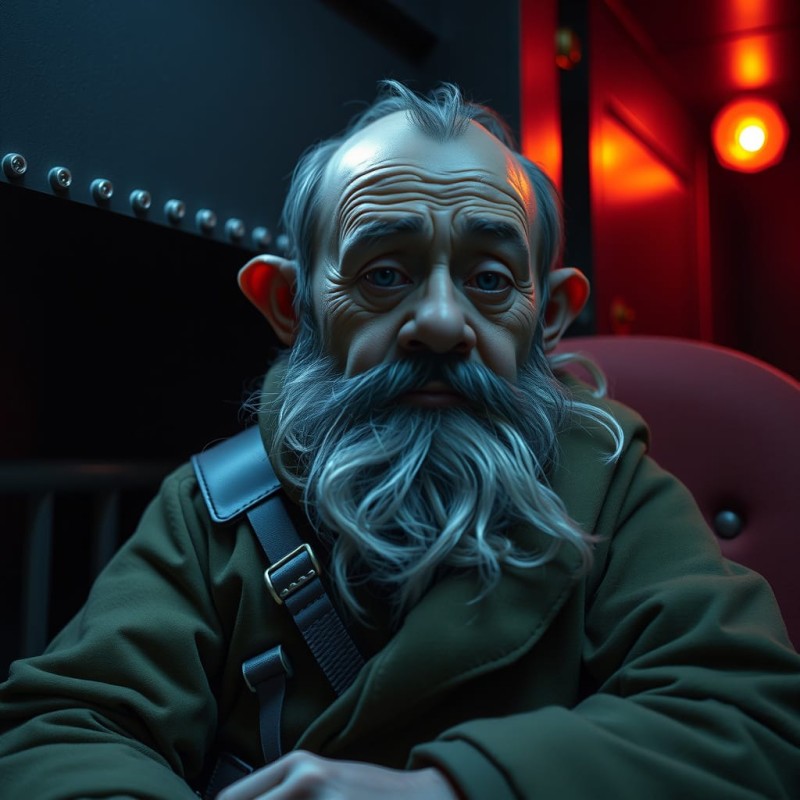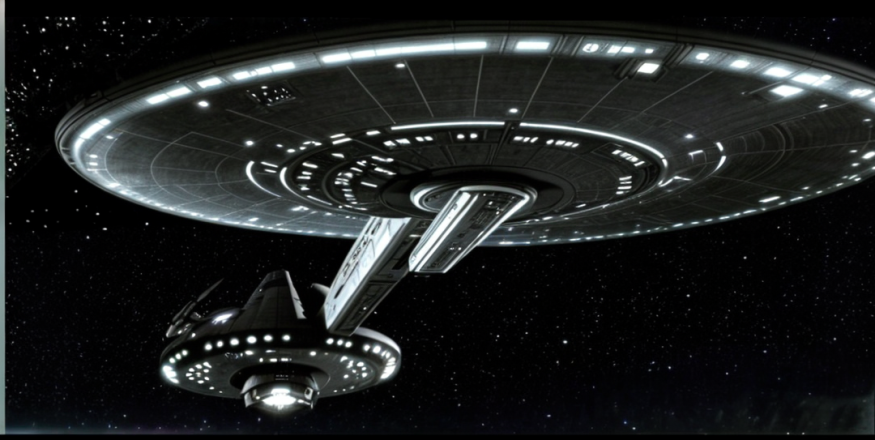 x
x
There was a dwarf who lived in the lower decks of the ship, and I visited him often. His name was Sulu. He was less than a meter in height---ninety-two centimeters, to be precise---yet he was strong and powerful. Although he was relatively well-proportioned, his head was slightly too big for his body; his face was heavily wrinkled, and he had always looked like an old man, even when he was young.
We distrusted one another, but this was tempered with mutual respect and admiration----he for my position of influence with the captain, and I for his intelligence and cunning.
I went to see Sulu following the bishop's sermon. Dirt, grime and stink all increased the farther you descended into the ship. Poor maintenance and different lifestyles. The downsiders actually cooked some of their meals in their own cabins, adding huge quantities of spices and other enhancers to give flavor and texture to the processed food product which provided the bulk of their diet, and you could smell it; the air circulation systems functioned inefficiently down there. In many ways, the lower levels felt more real.
Sulu's quarters consisted of two rooms filled with so much detritus I was always surprised it didn't spill into the corridors whenever the door was opened. Stacks of shipping crates, formed tables and counters which were covered by candles, music modules, hardcopy books and pamphlets, wood and stone carvings, drawing and painting supplies, strange bits of clothing and strings of beads, tiny glass figurines. The walls were almost completely hidden by pictures and drawings, photographs and framed strips of fabric. Some of this had been created by people aboard the ship, but much of it had been collected by earlier generations during landfalls on populated worlds.
Sulu served coffee when I arrived---the best coffee anywhere on the ship, and the only time I drank it black. Sulu and two other downsiders cultivated a clandestine coffee plantation in one of the ag chambers, kept most of the beans for themselves, and bartered the rest. Another reason I visited frequently. He settled into the cushions of his small bed, and I sat on a thickly padded chair that folded out from the wall.
A furry, elongated snout topped by two tiny black eyes poked out from the jumbled contents of one of the crates. It was Galileo, one of a couple hundred gogogoxes that now lived on the Enterprise, making themselves pets of a sort, adopting people throughout the ship. Someone had brought two mated pairs aboard fourteen years ago, at our last landfall. They were long and thin, about half the size of cats, and were now more numerous.
Galileo sniffed once, opened her mouth to reveal small but extremely sharp teeth---she seemed to be smiling at me---then pulled back and vanished.
"She likes you," Sulu said. "Usually she won't even make an appearance, but she always says hello when you come."
"I feel honored." I drank some coffee and sank back into the chair.
Sulu sat up and looked intently at me. "There won't be any survivors," he said, referring to our new destination.
I nodded. He was right. No one had said it aloud in the Executive Council session, but we all knew.
"It doesn't take in-depth analysis," Sulu went on. "A single, steady signal, no other electromagnetic emissions of any kind." He shook his head, almost smiling. "There's no one alive down there. Either they've all died, or there was never anybody there---maybe it's some emitter left behind by a commercial exploration team that discovered nothing of value, or impossible conditions." Then he shrugged as if the matter didn't concern him much, but I knew him better than that. "What does Captain Jean-Luc say?"
Sulu was the only one who called him that. To everyone else he was either Jean-Luc, Captain Picard, or simply "the captain."
"Nothing much." I was always reluctant to be too forthcoming with Sulu. We traded information---the real key to our relationship---and I didn't like to give away what might later turn out to be valuable. "He's unsure what effect our landfall will have on the ship's dynamics. "
"He's in trouble no matter what we find," Sulu said this with a nasty, almost gloating smile. "Abandoned colony, dead colony, even a surviving outpost or a full-fledged settlement with towns or cities spread out around the planet---though that, of course, is the least likely possibility. All of those would be bad, some worse than others. What your captain should hope for is that we find a planet completely uninhabitable for humans."
Sulu was wrong about that. The captain's position was so tenuous that he feared almost any change in the ship's routine, even it appeared aimless. The captain was wise to be afraid. But if something didn't change soon, nothing would help him.
"If the planet is habitable, however," Sulu resumed, "any number of possibilities present themselves."
"Like what?"
"Colonization, for one thing."
I just shook my head. Those in the upper levels, particularly in the First Echelon, had always resisted any moves in that direction, but I didn't want to get into a discussion with him about it.
"Why not?" Sulu asked.
"You know why not."
"That's no answer. What are you people scared of?"
"Just drop it," I told him.
Sulu stared at me with that ancient wrinkled face, hs expression hard, and I was scared he was going to push it. Then his face sagged and he slowly shook his head.
We talked some time longer, but about nothing else of import. I stayed long enough for another cup of coffee and a glass of his homemade distilled liquor. He called it whiskey, but it was far less successful than his coffee.
As I was leaving, Sulu said, "Things will be changing. Think about that. You and I can work together. We can be of use to one another."
I didn't want to encourage him, however, so I left without giving him a response. I didn't trust him. But then I didn't trust anyone, not even the captain.
Bishop Worf always managed to make major announcements on sacred days. On that Sacred Thursday, his voice booming from speakers mounted throughout the cathedral, he announced to an almost full congregation what most people already knew---that a signal had been detected. What was surprising, however, was that the bishop had given the planet a name.
"If there are people on this planet who have already christened their world," the bishop began, "then it shall be called by the name they have given it. If, however, they have not given it a name, or if their are not people there, it shall be called Antioch, after one of the great, early centers of Christian education on Earth. It was in Antioch that many different peoples were brought the word of God. I will now read from Acts:
"Now those who were scattered because of the persecution that arose over Stephen traveled as far as Phoenicia and Cyprus and Antioch, speaking the word to none except Jews. But there were some of them, men of Cyprus and Cyrene, who on coming to Antioch spoke to the Greeks also, preaching the Lord Jesus. And the hand of the Lord was with them, and a great number that believed turned to the Lord. News of this came to the church in Jerusalem, and they sent Barnabas to Antioch. When he came and saw the grace of God, he was glad; and he exhorted them all to remain faithful to the Lord with steadfast purpose; for he was a good man, full of the Holy Spirt and faith. And a large company was added to the Lord."
I laughed to myself, hearing that, for I couldn't help thinking about what had happened on our last landfall, when the bishop tried to do something similar---convert a city, an entire colony, to the Church---although in his case he attempted to do it by force, not by words. A disaster, as I have already mentioned. He should have read the Bible more carefully.
The bishop paused, and I nearly nodded off. Protocol required me to attend sacred day services, but protocol couldn't always keep me away, especially when the bishop preached. I tipped my head back and stared up into the shadowed reaches of the vaulting high above me, thinking about this vast and solemn place and thinking, as the bishop wanted, about the uncertain mission of the Enterprise.
The bishop claimed the ship's mission was to spread the word of God throughout the galaxy, even throughout the entire universe, to man and alien alike (there was no recorded contact with alien life that anyone was aware of, but the bishop continued to hope) . The bishop pointed to his unshakable faith and his exalted position in the ship's hierarchy as evidence for the religious nature of the ship's mission, which I found unconvincing. What was convincing, however, was the existence of the cathedral.
There could be little doubt that the cathedral had been incorporated into the original design of the ship. The occasional suggestion that the cathedral had been built into the ship at some far later date, after the Church had forced its way into a stronger position within the ship's social structure, was absurd. Structural engineers pointed to the cathedral's size and its central location, as well as the way to the ship's infrastructure so perfectly accommodated it. The main section of the cathedral was over 450 meters in length and 125 meters in height, with a set of enormous stained-glass windows behind the apse actually comprising a section of the ship's outer hull. Physical deflectors and an array of energy shields protected the stained glass from the forces and debris of interstellar travel. There were also extensions from the cathedral and other connected aisles and chapels that ran throughout that level of the Enterprise, culminating in the galilee, a small, private and secured chapel which had its own much smaller stained-glass windows lit from an interior light source.
I looked at the bishop, trying to remain alert, hoping to get some idea of what he planned for Antioch, and for Jean-Luc.
"Bring people the word of God: that is one of the most important things we can do. The exploration and colonization of worlds presents us with one of our greatest opportunities to do just that. Human and alien alike, we all need God, we all need to know His word and His works. It is one of our missions to bring the word of God to those who are ignorant of Him, and to establish outposts on those places where others may come in the future."
I began losing interest again because he was moving on to one of his regular sermons. The bishop's dream was to set up an intergalactic network of missions committed to converting all intelligent beings, "human and alien alike," and bringing them into the Church.
He had visions of grandeur, and he was arrogant. But, alas, he had a great deal of power, which was growing day by day as Jean-Luc's power waned. I sat through the rest of his sermon, no longer listening, but watching him, and I grew more and more afraid that I was seeing my future.
ns18.222.135.39da2





















